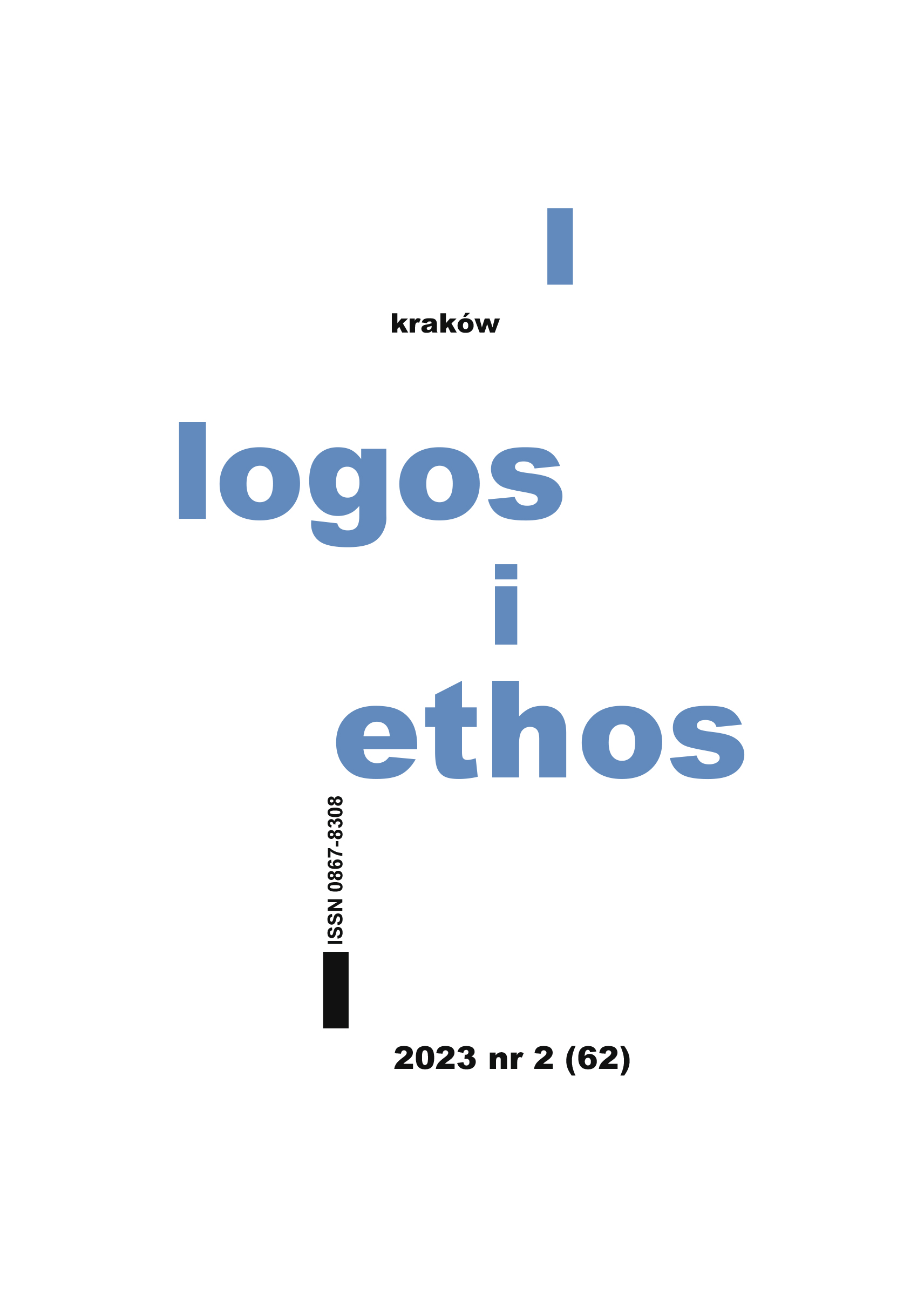Plato’s Theaetetus end logos of the digital humanities
DOI:
https://doi.org/10.15633/lie.62206Słowa kluczowe:
Platon, Theaetetus, logos, phenomenology, digital humanitiesAbstrakt
Specyfiką nauk humanistycznych jest badanie człowieka i jego dziedzictwa, o czym przypomina już Sokrates w Teajtecie. Dialog ten wyznacza istotną zmianę u Platona — odkrycie to należy przypisać Wincentemu Lutosławskiemu, autorowi chronologii dzieł Platona — tj. od idei preegzystujących i transcendentalnych do kategorii rozumu, od filozofii jako “umiłowania mądrości” do “umiłowania wiedzy”. Tak więc, w przeciwieństwie do szeroko rozpowszechnionego poglądu o tak zwanym braku definicji wiedzy w Teajtecie, argumentuję, że poszukiwanie wiedzy odnosi się do logiki myślenia — tematu związanego z logiką odkrycia Charlesa S. Peirce’a i wciąż odrębnego od “technologii” — i stanowi konstytucję humanistyki ery informacji i komunikacji jako cyfrowej humanistyki.
Bibliografia
Brace K. S., Rudell R. L., Bryant R. E., Efficient implementation of a BDD package, 27th ACM/IEEE Design Automation Conference, 1990, p. 40–45; https://doi.org/10.1109/DAC.1990.114826.
Bryant R. E., Graph-Based Algorithms for Boolean Function Manipulation, “IEEE Transactions on Computers” C-35 (August 1986) issue 8, p. 677–691; https://doi.org/10.1109/TC.1986.1676819.
Burnet J., Early Greek Philosophy, London 1945.
Burnet J., The Socratic Doctrine of the Soul, London 1916.
Carr N., Is Google Making Us Stupid? What the Internet is doing to our brains, The Atlantis 2008.
Fisch M., Turquette A., Peirce’s Triadic Logic, “Transactions of the Charles S. Peirce Society” 2 (1966) no. 2, p. 71–85.
Janik P., Weryfikacja równoważności funkcjonalnej opisów układów cyfrowych, University of Science and Technology, Wrocław 1992, M. S. Thesis.
Janik P., The Matrix, or when the natural world is scary, in: Intentionnalite as idee: Phenomenon between efficacy and analogy, eds. P. Janik, C. Canullo, Kraków 2021, p. 163–179; https://doi.org/10.12797/9788381385978.09.
Kordos M., Wykłady z historii matematyki, Warszawa 2005.
Lutosławski W., The Origin and Growth of Plato’s Logic: With an Account of Plato’s Style and of the Chronology of his Writings, Longmans 1897.
Łukasiewicz D., On Jan Łukasiewicz’s many-valued logic and his criticism of determinism, “Philosophia Scientiæ” 15 (2011) 2, p. 7–20; https://doi.org/10.4000/philosophiascientiae.650.
Łukasiewicz J., Aristotle’s Syllogistic from the Standpoint of Modern Formal Logic, Dublin 1957.
Ofman S., Comprendre Les Mathématiques Pour Comprendre Platon — Théétète (147d–148b), “Lato Sensu. Revue de la Société de philosophie des sciences” 1 (2014) no. 1, p. 71–80.
O’Hara D., The slow percolation of forms: Charles Peirce’s writings on Plato, Ph.D. dissertation, https://etda.libraries.psu.edu/catalog/6652 (01.12.2022).
Ong W., Language as Hermeneutic. A Primer on the Word and Digitization, Ithaca–London 2017.
Patočka J., The Spiritual Person and the Intellectual, in: Living in Problematicity (Svazek). Kindle Edition.
Patočka J., Plato and Europe, Stanford (CA) 2002.
Peirce Ch. S., How to make our ideas clear, “Popular Science Monthly” 12 (January 1878), p. 286–302.
Peirce Ch. S., The Logic of Relatives, in: Collected Papers of Charles Sanders Peirce, t. 3–4, eds. Ch. Hartshorne, P. Weiss, Harward University Press, Cambridge, Mass. 1933.
Plato, Phaedrus, in: Plato, Complete Works, ed. J. M. Cooper, Indianapolis–Cambridge 1997, p. 506–556.
Plato, Theaetetus, in: Plato, Complete Works, ed. J. M. Cooper, Indianapolis–Cambridge 1997, p. 157–234.
Shin Sun-Joo, Peirce’s Deductive Logic, The Stanford Encyclopedia of Philosophy (Summer 2022 Edition), ed. E. N. Zalta; https://plato.stanford.edu/archives/sum2022/entries/peirce-logic/.
Pobrania
Opublikowane
Numer
Dział
Licencja

Utwór dostępny jest na licencji Creative Commons Uznanie autorstwa 4.0 Międzynarodowe.
Autorzy publikujący w czasopiśmie udzielają jego wydawcy zgody o następującej treści:
- Autor zachowuje autorskie prawa majątkowe do utworu, a jednocześnie udziela wydawcy czasopisma zgody na jego pierwszą publikację w wersji drukowanej i wersji online na licencji Creative Commons Uznanie autorstwa 4.0 Międzynarodowe oraz zgody na wykonywanie opracowań, w tym przekładów.
- Autor ma możliwość udzielania zgody niewyłącznej na opublikowanie utworu w wersji, która ukazała się w czasopiśmie (np. zamieszczenia go w repozytorium instytucjonalnym lub opublikowania w książce), wraz z informacją o jego pierwszej publikacji w czasopiśmie.
- Autor może umieścić swój utwór online (np. w repozytorium instytucjonalnym lub na swojej stronie internetowej) jeszcze przed zgłoszeniem utworu do czasopisma.

